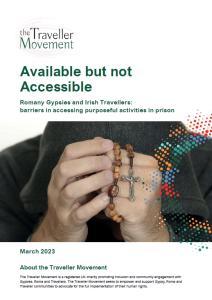
Last week PET’s Chief Executive Jon Collins spoke at the launch of an excellent new report from the Traveller Movement. Available but not Accessible looks at the barriers that Romany Gypsies and Irish Travellers face in accessing purposeful activities in prison – including their experience of education. Here, he takes a look at what the report found.
Romany Gypsy and Irish Traveller people are heavily overrepresented within the criminal justice system. Despite only making up an estimated 0.1% of the population, 5% of people in prison identify as Romany Gypsy or Irish Traveller. Moreover, education provision may be particularly important for this group given that, as the report notes, 68% of Romany Gypsy and Irish Traveller people in prison did not complete school.
The report is occasionally enraging, genuinely insightful and well worth a read. It is also well-timed in terms of considering what an effective prison regime should look like, with HMPPS in the midst of a project on future regime design and new contracts for the delivery of prison education about to be tendered.

Worrying data on education participation
Based on a snapshot of data from five prisons, the report found that 69% of Gypsy, Roma and Traveller (GRT) people were taking part in purposeful activity – activities provided in prisons to assist with rehabilitation, such as education, training and employment – compared to 64% of the overall prison population. Similarly, GRT people were more likely to be participating in vocational training than the overall population.
But worryingly GRT people were less likely to be taking part in education than the overall population (16% vs 20%).
The findings of the focus groups carried out with Romany Gypsies and Irish Travellers shed some light on the issues underpinning these numbers.
They suggested that Romany Gypsies and Irish Travellers would rather take part in prison-based work than in education. There were multiple reasons for this, from the fact that education is often less well paid than work, to a reluctance to participate in classroom-based education (in part due to negative childhood experiences of education), to ambivalence about whether literacy and numeracy skills are really that important. Some participants expressed a preference for vocational courses that would help them find work on release.
Participants also expressed resentment about prison policies that excluded them from higher-paying prison jobs until they had completed literacy courses. This, in effect, makes these courses mandatory. It also penalises Romany Gypsies and Irish Travellers – who on average have lower levels of literacy when entering prison – by preventing them from participating in their preferred activities.
Recommendations for change
The report makes a series of sensible recommendations for change on education.
They include improving access to one-to-one learning schemes for those reluctant to participate in classroom-based education; the provision of more age-appropriate reading materials; and the introduction of more courses that combine practical vocational skills with literacy and numeracy.
- 2022’s top distance learning courses in prison
- Understaffed and underfunded: the impact of staff shortages on prison education
- “Your future’s not written because of where you’re from”
It also highlights the importance of introducing the idea of mandatory education sensitively, including using culturally competent and appropriate learning materials. This would help to reduce conflict and improve relationships between staff and prisoners.
These recommendations would all undoubtedly improve the experience of Romany Gypsies and Irish Travellers in prison, making it more likely that they would willingly take part in education. But there are also broader lessons here for the provision of education, lessons that should be taken into account in the design of the new Prison Education Service.
Helping make prison education better for everyone
Firstly, education must be prison-wide. Effective prison education, and particularly the development of literacy and numeracy skills, cannot only be delivered in classrooms. It must also permeate other elements of the prison regime. Bricklaying courses can encompass literacy and numeracy, for example, as the report recommends.
Secondly, as far as possible prison education needs to be personalised. This report highlights how learners’ differing needs, interests and aspirations need to be met if education is going to be appealing and engaging. There are, of course, limits to the extent to which education provision can be individually tailored. But the more it can be personalised, the greater impact it will have.
Finally, for any of this to be achievable prison education has to be properly funded. This report highlights, yet again, both the importance of prison education and the challenges with delivering it effectively. If these challenges are going to be met, then current woeful levels of underfunding must be addressed.
Given the overrepresentation of Romany Gypsies and Irish Travellers in the prison population and the negative experiences recounted in this report, making prison regimes more accessible should clearly be a priority. But it is also the case that making these changes would help to make prison education better for everyone, improving what is offered and enabling more people in prison to access the life-changing power of education.